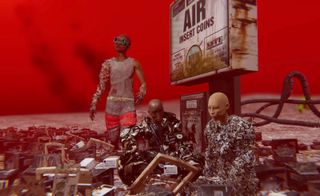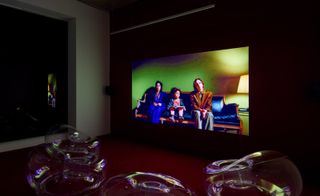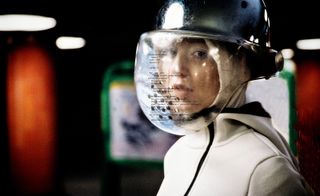Cyber-noia, pornography, and liberation: inside the queer sci-fi of Shu Lea Cheang
Shu Lea Cheang's new film, ‘UKI’, exists in two worlds simultaneously: the real world of flesh and blood, and a strange digital landscape

The world(s) that come to life in Shu Lea Cheang’s films are always evolving. As our relationship to exponential, transformational changes in technology have developed, so too has Cheang’s cinema. From the punk aesthetics and ‘eco-cyber-noia’ of queer cult classic Fresh Kill (1994) to the digital spaces of her most recent film, UKI (2023), the filmmaker is constantly interrogating our place in a world that seems to be on the verge of being taken over by technological advances.
A retrospective of her works, titled ‘Sci-Fi New Queer Cinema’, was recently staged at London's Project Native Informant gallery and is now set to show at Brooklyn Academy of Music (BAM) in mid-June 2024.
For Cheang, the transition of her work from cinema screens to arts venues offers a chance to see it in a new context, even as she makes ‘feature films to be shown in the cinema with a movie-going audience’; she hopes that the retrospective is able to ‘set up an intimate viewing environment’. There’s an intimacy throughout Cheang’s films, whether in the minutiae of queer relationships explored in Fresh Kill, or the power she imbues into eroticism with I.K.U (2001), a pornographic riff on Blade Runner.

Shu Lea Cheang, UKI, 2023, single-channel HD video 1 hour, 20 mins
The title of the retrospective offers another look into the tensions that seem to animate the artistry and historical context in which Cheang’s films exist. ‘Sci-Fi New Queer Cinema’ is a designation that Cheang herself settled on out of a rejection of ‘being termed experimental with my films’. In fact, she affords each film its own niche genre: Fresh Kill is eco-cyber-noia, I.K.U is sci-fi steampunk, and UKI is ‘sci-fi viral alt reality cinema’.
UKI exists in two worlds simultaneously: the real world of flesh and blood, and a strange digital landscape that occupies a midpoint between dumping ground and archive. It sees Cheang explore the relationship between technology, film, and art in interesting new ways – so much imagery is referential to the vast, lonely cityscapes of Edward Hopper – this nod to art history seeming to capture the ways in which technology might be making us more lonely when we’re not plugged into cyberspace. This ever-evolving tech landscape is at the heart of how Cheang’s own films have changed in the decades since her debut.
Cheang acknowledges the importance of the changing nature of technology to her film practice, saying that her work has, ‘advanced with digital/electronic technology, in step with the social/political issues brought about’ by these changes. And while the advancements – and potential pitfalls – of technology recur throughout the artist’s feature films, the thing that seems to animate them most is a political gesture towards liberation, and how technology might help or hinder that.

Exhibition view, ‘Sci-Fi New Queer Cinema’
In Cheang’s films, desire and sexuality are vehicles to this idea of liberation, something that can be seen in the way they engage with ideas around pornography. I.K.U, produced by Takashi Asai of Uplink Tokyo, was made, according to Cheang, ‘to challenge Japan’s particular censorship around naked sexual organs’. But more than just this, I.KU. explores the relationship between intimate acts and a technological landscape that is embedded even deeper into our everyday lives. Cheang puts emphasis on what she calls ‘the charm of porn: no build-up, no excuse, direct to the sex act. Here the plot made it simple: sex for data, orgasm for consumption.’
Wallpaper* Newsletter
Receive our daily digest of inspiration, escapism and design stories from around the world direct to your inbox.
The relationship between the human body, and the data that seems to constitute it, runs through much of Cheang’s most recent work; UKI functioning as a pseudo-sequel to I.K.U presents the title character of the earlier film as being a relic in a digital graveyard, less a living thing and more of a repository for data – an echo of how sex functions in I.K.U –something that Cheang has been grappling with across several films now. In Fluidø (2017), she explores a complex relationship between viruses, wellness, and the manufacturing of psychoactive drugs in a world set decades in the future, when HIV/AIDS has been eradicated. Cheang calls this an ‘attempt at reconciliation with the pain of lost intimacy’, something that seems to gesture towards not only the historical and contemporary losses that defined so much of the AIDS crisis, but also the possibilities of what happens when the most intimate parts of our lives are simply another part of us that can be sold off. Cheang calls this ‘a future [where] our bodies are colonised, engineered, reconstituted. We own an empty shell of a body whose data we no longer have access to.’

Shu Lea Cheang, Fluidø, 2017, single-channel HD video 1 hour, 20 mins
Amidst this ever-evolving landscape, career retrospectives, and being awarded the LG Guggenheim Award, Cheang finds that there’s still an uncertainty around how to define her practice, saying that museums are ‘still working out how to ID me, as an artist or a filmmaker, not ready to merge these two mediums (or more) as my multi-faceted art practice’.
With the four features that make up ‘Sci-Fi New Queer Cinema’ next set to screen at BAM, Cheang’s work will continue to shift between gallery settings and the cinema-going public. Both ways of screening the film, of engaging with Cheang’s work, seem to offer viewers a way into what the artist herself sees as the heart of her work, her belief that ‘trusting resistance through intimacy is possible’.
Shu Lea Cheang's films are to be screened mid-June at Brooklyn Academy of Music (BAM)
-
 Shigeru Ban wins 2024 Praemium Imperiale Architecture Award
Shigeru Ban wins 2024 Praemium Imperiale Architecture AwardThe 2024 Praemium Imperiale Architecture Award goes to Japanese architect Shigeru Ban
By Ellie Stathaki Published
-
 Stone Island and New Balance team up for this year’s most sought-after sneaker
Stone Island and New Balance team up for this year’s most sought-after sneakerPart of Stone Island’s monochromatic ‘Ghost’ line, the collaboration is inspired by both brand’s longtime links with British subculture
By Jack Moss Published
-
 Step inside Apple Park Observatory, the tech giant's new hub for events and innovation in Cupertino
Step inside Apple Park Observatory, the tech giant's new hub for events and innovation in CupertinoApple Park Observatory, unveiled in Cupertino, adds to the tech giant's expansive campus by Foster + Partners in California
By Ellie Stathaki Published
-
 New film, Hollywoodgate, finds out what really happened when the US left Afghanistan
New film, Hollywoodgate, finds out what really happened when the US left AfghanistanFilmmaker Ibrahim Nash’at’s Hollywoodgate follows Taliban soldier MJ Mukhtar and air force commander Mawlawi Mansour in the aftermath of America’s withdrawal in August 2021
By Zoe Whitfield Published
-
 Toys, fantasy and the US immigration system: inside Julio Torres' debut film, Problemista
Toys, fantasy and the US immigration system: inside Julio Torres' debut film, ProblemistaJulio Torres writes, directs and stars in Problemista – now on digital release – where the nightmare of US immigration is given a surreal spin
By Hannah Silver Published
-
 First Fraenkel Film Festival in San Francisco: what to see
First Fraenkel Film Festival in San Francisco: what to seeThe Fraenkel Film Festival, at the Roxie Theater in San Francisco, sees ten Fraenkel gallery artists choose films that impact their work
By Lauren Cochrane Published
-
 Paul B. Preciado on his Orlando film: 'There is no trans question'
Paul B. Preciado on his Orlando film: 'There is no trans question'Paul B. Preciado interprets Virginia Woolf’s work in 'Orlando, My Political Biography'
By Sam Moore Published
-
 Enter the immersive world of film noir at a disused hospital in Venice
Enter the immersive world of film noir at a disused hospital in VeniceFondazione In Between Art Film returns to Venice with ‘Nebula’, by curators Alessandro Rabottini and Leonardo Bigazzi
By Amah-Rose Abrams Published
-
 Cannes Film Festival 2024 highlights: our verdict is in
Cannes Film Festival 2024 highlights: our verdict is inWhat to watch or not to watch – cut to the Cannes Film Festival 2024 highlights
By Sophie Monks Kaufman Published
-
 ‘What a Fantastic Machine’: new film explores the camera, pop culture and human behaviour
‘What a Fantastic Machine’: new film explores the camera, pop culture and human behaviourMaximilien Van Aertryck and Axel Danielson’s new film, ‘And the King Said, What a Fantastic Machine’, dissects the role of the camera in popular culture
By Zoe Whitfield Published
-
 Back to Black: all eyes on film-maker Sam Taylor-Johnson
Back to Black: all eyes on film-maker Sam Taylor-JohnsonBack to Black cinematographer Polly Morgan tells Wallpaper* how a shared love of French New Wave close-ups brought Sam Taylor-Johnson’s Amy Winehouse biopic to life
By Craig McLean Published